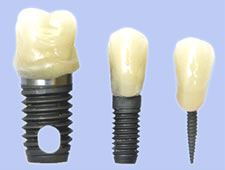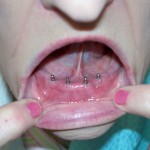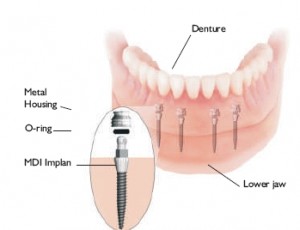In this modern world of everything getting smaller and working better, why should the same engineering principles not apply to dental implants? With the advent of titanium alloy, we can create stronger mini dental implants that are around half the size of a regular dental implant and just as strong. With over 30 million Americans without teeth, there is a huge demand for dentures that don’t move when patients try to eat. Most of these patients have not been offered dental implants for lots of reasons. More often than not, it is because of the high cost of implant treatment.
With the advent of the mini dental implant, the typical cost of implant treatment has been reduced by 50%. Because mini implants are less expensive, more patients can choose to stabilize their loose dentures or even consider getting a fixed full arch of crowns to replace the denture entirely. Mini dental implants cost less mainly because of the following reasons:
- faster procedure – they are placed in one stage and allow immediate loading, which saves valuable office time for the dentist
- simpler procedure – the surgical dental implant procedure is simpler, without the need of specially trained staff or special equipment
- lower material cost – the actual implant manufacturer cost is much less for MDIs
- lower training cost – due the simplicity of the procedure, mini dental implants do not need the same costly learning and training as conventional implants.
The mini implant procedure is very fast. Unlike standard implants, mini dental implants allow immediate loading. The procedure can be completed in a few hours and the patient can return home with fully functional implant retained dentures, without waiting several months for osseointegration as with standard implants.
At around half the size, mini implants don’t require as much bone. Due to this feature, a mini implant can be placed in the bone that is left. Expensive bone grafting or bone expansion surgical procedure are typically not needed.
The placement of the mini implant is also very non-invasive. A small pilot bit is used to create the opening for the implant to be threaded into the bone. Using such a minimally invasive procedure means the patient can heal faster, have less discomfort, and can use the implant much sooner. There are less chances for surgical errors such as damage to nerves or sinuses. Even if such a condition occurs, it can be corrected much easier due to the smaller size of damaged area. A regular implant is placed much differently. It requires a full flap of gum must be pushed back to see the bone. The bone is then removed with a series of burs to create space for the dental implant to be inserted. All of this surgical protocol can be avoided with a mini dental implant.
Another benefit of getting a mini dental implant is that it not only secures a once loose denture, it now preserves the bone that is left. Without teeth roots, the bone just melts away. A denture actually speeds up the process of the bone resorbing away by constantly rubbing on the overlying gum tissue. A mini dental implant stimulates the bone just like a tooth root would.
Mini dental implants have been approved for use in the US since 1997. Success ratios are equal to regular implants. When complications do arise with mini dental implants, the typical treatment is to move the mini implant to an adjacent spot. Because no bone is removed, the small opening in the gum closes and the body will fill in the defect with new bone. Post-surgical complications (pain, bleeding, surgical trauma) are known to be very limited when mini implants are used.
Mini dental implants offer a simpler solution that is less technically demanding for the dental professional. Many implant dentists now prefer the use of mini dental implants, when possible, over standard dental implants due to the simplicity of the procedure, the smaller risks involved and the less requirements in terms of learning and experience. Mini dental implants technology has allowed many dental professionals with no or minimal surgical training to be able to offer implant treatment to their patients.
Mini dental implants (MDI) are much more than a solution for loose lower dentures. They can be used virtually anywhere in the mouth. Undoubtedly the lower denture presents the most difficulty for patients adjusting to dentures for the first time, or even for experienced denture wearers. It can be frustrating as you attempt to eat certain foods, or even to speak with confidence without fear that your lower denture will begin to float in your mouth.
Many practices have recently introduced a new treatment procedure called a Denture Stabilization System, often referred to as Mini Dental Implants (MDI). Essentially it is a dental implant system that in most cases can be placed and attached to your lower denture in the same visit. Within one hour you can be on your way with a secure lower denture, and able to eat and speak much more confidently.
They can have been used to:
- Secure Upper and Lower Dentures
- Replace a Single Missing Tooth
- Replace Multiple Missing Teeth
- Get rid of a Denture entirely and replace it with fixed Porcelain Crowns
- Get rid of a metal partial denture
However, mini dental implants cannot substitute regular implants in every case. Some restrictions apply, which when violated may cause dental implant failures.
- Mini dental implants are approved by FDA only for lower jaw denture stabilization. They are not yet FDA approved as substitutes of standard implants in other cases.
- more MDIs are needed for denture stabilization. The minimum for the lower jaw is 4 mini implants when only 2 are needed if standard width implants are used.
- MDIs do not perform as well in the upper jaw which has usually less bone density. If mini dental implants are used for upper jaw, a larger number is needed (10-12 MDIs).
- mini dental implants are solid. If the implant head wears off due to daily use after some years the whole implant has to be extracted and replaced. With conventional implants only the abutment has to be replaced.
- There is no guarantee to the longevity of mini implants. It still depends on functional load and how your bone reacts to its existence.


